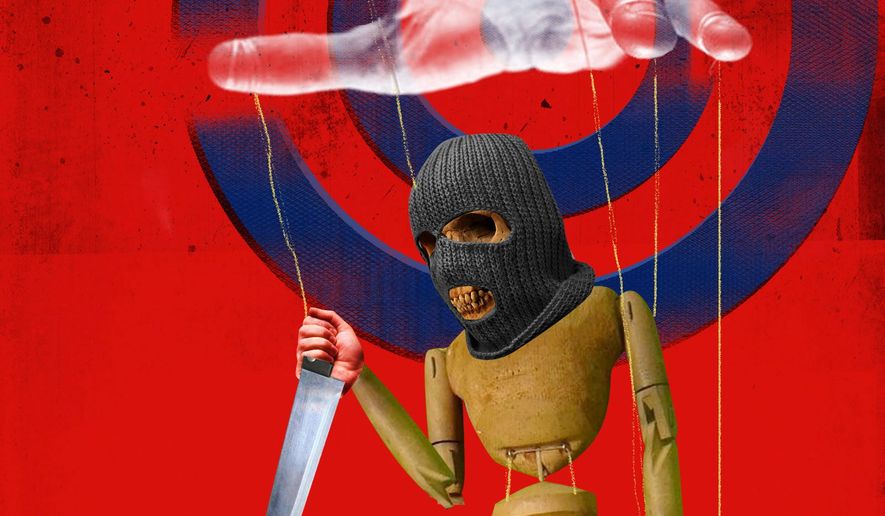OPINION:
“Killing for them is a habit,” Rasha al-Ameer told reporters last week.
By “them” she meant Hezbollah, a designated terrorist organization that is Lebanon’s most powerful political party, with a militia the Lebanese Armed Forces dares not challenge. Hezbollah operates internationally and is known to partner with Latin American drug cartels. One more pertinent fact you should know: Hezbollah’s primary allegiance is to the Islamic Republic of Iran.
The killing in question on this occasion was that of Miss al-Ameer’s brother, Lokman Slim, a prominent Lebanese Shia filmmaker, publisher and activist who had the temerity to criticize Hezbollah for the incalculable harm it has done to his long-suffering country.
On Thursday, Mr. Slim was found dead in his car, on a rural road, shot three times in the head, once in the chest, and once in the back. His assassins, it seems, wanted to be sure they had done their job properly.
Hezbollah, Iran’s rulers, and other adversaries of the United States hope, and perhaps expect, that the new American administration will do nothing much in response, which assures that the “international community” will do nothing much in response. A Leninist maxim guides them: “Probe with your bayonets. If you encounter mush, proceed; if you encounter steel, withdraw.”
And not just on their home turf: Last Thursday, an Iranian diplomat was sentenced by a Belgium court to 20 years in prison for having plotted to bomb a rally of exiled dissidents in France in 2018.
The diplomat, Assadollah Assadi, had supplied explosives and a detonator. The charges for which he was convicted included “attempted terrorist murder.”
Does his sentencing suggest that Europeans are finally getting tough on Iran’s rulers? No, putting one diplomat-cum-terrorist behind bars is small potatoes.
The very next day, Josep Borrell, the European Union’s foreign policy chief, reassured Tehran that more serious consequences would not be forthcoming. The “maximum pressure” campaign initiated by President Trump should end, he asserted, replaced by a “maximum diplomacy” campaign.
Mr. Borrell then flew to Moscow where, three days earlier, Aleksei Navalny had been sentenced to prison. A Russian opposition leader, Mr. Navalny was poisoned with a military-grade nerve agent last summer — an assassination attempt that he and Western officials believe was ordered by Russian President Vladimir Putin.
Mr. Navalny survived only because friends managed to get him out of Russia for treatment. Upon his return last month, he was immediately arrested.
In Moscow, Mr. Borrell was informed that the Russian government was expelling several European diplomats who, it was charged, had participated in “illegal protests” in support of Mr. Navalny.
Mr. Borrell “strongly condemned” the expulsions. “All European member states are united against it,” he emphasized, demanding — or just suggesting — that the expulsions be “reconsidered.” This demonstration of “maximum diplomacy” appears to have impressed Mr. Putin not at all.
Meanwhile, the “maximum pressure” which Mr. Borrell is keen to end has put Iran’s rulers under serious economic stress. Nevertheless, they have managed to scrape together the funds necessary to arm Houthi rebels in Yemen — whose designation as terrorists the Biden administration last week rescinded — and to continue supplying Hezbollah with precision-guided missiles (PGMs) aimed at Israel.
In an initial response to the assassination of Mr. Slim, Secretary of State Antony Blinken issued a statement that did not mention Hezbollah but said instead: “We join the international community in calling for his killers to be brought to swift justice.”
Fat chance. Remember the catastrophic explosion that killed more than 200 people in Beirut last August? The investigation has ground to a halt.
Lebanese authorities (meaning Hezbollah and its allies) have declined offers of an international probe — not that such an inquiry would do better.
Remember the 2005 Beirut bombing that killed former Prime Minister Rafik Hariri along with 21 bystanders? An international investigation and U.N. Special Tribunal spent the next 15 years and millions of dollars only to convict one low-level Hezbollah operative who was tried in absentia, his whereabout said to be unknown. The court acknowledged that Hezbollah had motive to “eliminate” Mr. Hariri but declined to issue a conclusive determination.
Look, I understand that President Biden has no good options. But he does have bad options. Those he might want to avoid. Among the worst would be to reward Hezbollah, Iran’s rulers, Mr. Putin and others who have the habit of murdering dissidents, at home and abroad.
That means no economic rescue for Lebanon — currently sinking in debt, its banks riddled with corruption — so long as Hezbollah is calling the shots. And it is now more obvious than ever how foolhardy it would be to lift sanctions on Tehran and return to the misleadingly named Joint Comprehensive Plan of Action.
Despite repeated claims to the contrary, that deal did not end the regime’s nuclear weapons program. At most, it delayed progress in some areas — until the “sunset” clauses kick in, vaporizing restrictions — while implicitly licensing the regime’s terrorism and other malign activities.
Diplomacy can and should continue. But diplomacy should not be confused with therapy. When dealing with despots, there are no talking cures.
Enriching, empowering, and accommodating those who despise us and murder with impunity does not transform them into friendly neighbors in the global village. That approach has been tried. It consistently disappoints.
Does President Biden understand all that? Hezbollah, Iran’s rulers, Mr. Putin and other adversaries of the United States are watching. Their bayonets are affixed. They’re eager to know whether it’s safe to proceed.
• Clifford D. May is founder and president of the Foundation for Defense of Democracies (FDD) and a columnist for The Washington Times.




Please read our comment policy before commenting.